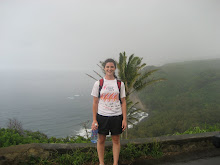Thursday, October 7, 2010
Edward
The mother in this poem is the one who should be blamed for the bad things that happen. I feel like she influenced her son to kill his father. When he tells his mother he is leaving, the mother asks "and what will ye leave to your own mother dear?" I think she planned this whole thing out. She was going to influence Edward, her son, to kill his father, her husband, so she could gain all of his belongings. Edward was going to leave the country anyway and not leave anything to his wife or children. Therefore, his mother wanted it.
Elegy for My Father, Who Is Not Dead
The speaker is writing this poem to cope with the fact that his father is going to die. The father feels like he is ready to die and assures his son that they will meet again in heaven. The speaker thinks otherwise. He thinks that once his father dies, that will be the last time he sees him. He is "convinced his [father's] ship's gone down." This poem serves as a way to express the speaker's emotions of loss. He doesn't want his father to die but knows that death is inevitable.
Do Not Go Gentle into The Good Night
By repeating the first and third lines of the poem, the speaker describes different types of people who are dying. Wise men, although they know that death is inevitable, "do not go gentle into that good night" because there is still a lot of things to learn and teach on earth. Good men fight against the night because they see how good their life is on earth and don't want to leave it. Therefore, they "rage against the dying of the light." Wild men play around and waste their lives. When they realize the end is near, they also "do not go gentle into that good night." Grave men who are about to die "rage against the dying of the light" because they don't want to give into death. All of these men serve as examples to the speaker's father. The speaker wants his father to not die and to fight against the "dying of light." The repetition of the lines serve to emphasize the different meanings and interpretations that a reader can grasp.
Wednesday, October 6, 2010
That time of year
In each of the three quatrains, there are three major images introduced. In the first, the speaker is referring to the end of fall "when yellow leaves" turn colors from green and fall to the ground. The beauty of fall eventually comes to an end, just like almost everything in life. The image in the second quatrain is one of twilight and then night. "After sunset fadeth in the west," night comes and ends the day. Once again, the speaker is emphasizing that almost everything in this world will end. The last quatrain was a little hard for me to figure out. I think the image is one of a funeral or someone dead. These lines, along with the others reinforce the ending of something. The couplet at the end of the poem, though, contradicts the rest of the lines. The speaker says that although almost everything ends, these things will only make the love between him and his lover stronger.
Subscribe to:
Comments (Atom)
